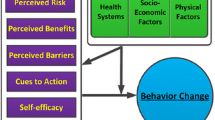ABSTRACT
BACKGROUND
Uncontrolled hypertension remains a significant problem for many patients. Few interventions to improve patients’ hypertension self-management have had lasting effects. Previous work has focused largely on patients’ beliefs as predictors of behavior, but little is understood about beliefs as they are embedded in patients’ social contexts.
OBJECTIVE
This study aims to explore how patients’ “explanatory models” of hypertension (understandings of the causes, mechanisms or pathophysiology, course of illness, symptoms and effects of treatment) and social context relate to their reported daily hypertension self-management behaviors.
DESIGN
Semi-structured qualitative interviews with a diverse group of patients at two large urban Veterans Administration Medical centers.
PARTICIPANTS (OR PATIENTS OR SUBJECTS)
African-American, white and Latino Veterans Affairs (VA) primary care patients with uncontrolled blood pressure.
APPROACH
We conducted thematic analysis using tools of grounded theory to identify key themes surrounding patients’ explanatory models, social context and hypertension management behaviors.
RESULTS
Patients’ perceptions of the cause and course of hypertension, experiences of hypertension symptoms, and beliefs about the effectiveness of treatment were related to different hypertension self-management behaviors. Moreover, patients’ daily-lived experiences, such as an isolated lifestyle, serious competing health problems, a lack of habits and routines, barriers to exercise and prioritizing lifestyle choices, also interfered with optimal hypertension self-management.
CONCLUSIONS
Designing interventions to improve patients’ hypertension self-management requires consideration of patients’ explanatory models and their daily-lived experience. We propose a new conceptual model — the dynamic model of hypertension self-management behavior — which incorporates these key elements of patients’ experiences.

Similar content being viewed by others
REFERENCES
Ostchega Y, Yoon SS, Hughes J, Louis T. Hypertension awareness, treatment, and control–continued disparities in adults: United States, 2005–2006. NCHS Data Brief. 2008;3:1–8.
Berlowitz DR, Ash AS, Hickey EC, , et al. Inadequate management of blood pressure in a hypertensive population. N Engl J Med. 1998;339(27):1957–1963.
Rose AJ, Berlowitz DR, Orner MB, Kressin NR. Understanding uncontrolled hypertension: is it the patient or the provider? J Clin Hypertens (Greenwich). 2007;9(12):937–943.
Bosworth HB, Oddone EZ. A model of psychosocial and cultural antecedents of blood pressure control. J Natl Med Assoc. 2002;94(4):236–248.
Di Matteo M. Variations in patients' adherence to medical recommendations: a quantitative review of 50 years of research. Medical Care. 2004;42(3):200–209.
Stockwell DH, Madhavan S, Cohen H, Gibson G, Alderman MH. The determinants of hypertension awareness, treatment, and control in an insured population. Am J Public Health. 1994;84(11):1768–1774.
Glynn L, Murphy A, Smith S, Schroeder K, Fahey T. Interventions used to improve control of blood pressure in patients with hypertension. Cochrane Database of Systematic Reviews. 2010;2010(3):CD005182.
Bosworth HB, Olsen MK, Neary A, et al. Take Control of Your Blood Pressure (TCYB) study: a multifactorial tailored behavioral and educational intervention for achieving blood pressure control. Patient Educ Couns. 2008;70(3):338–347.
Kressin NR, Wang F, Long J, et al. Hypertensive patients' race, health beliefs, process of care, and medication adherence. J Gen Intern Med. 2007;22(6):768–774.
Kleinman A, Eisenberg L, Good B. Culture, illness and care: Clinical lessons from anthropologic and cross-cultural research. Ann Intern Med. 1978;88(2):251–258.
Blumhagen D. The meaning of Hyper-tension. In: Chrisman NaM, TW, ed. Clinically applied anthropology: D. Reidel Publishing Company; 1982:297-323.
Heurtin-Roberts S, Reisen E. The relation of culturally influenced lay models of hypertension to compliance with treatment. American Journal of Hypertension. 1992;5(11):787–792.
Schlomann P, Schmitke J. Lay beliefs about hypertension: an interpretive synthesis of the qualitative research. J Am Acad Nurse Pract. 2007;19(7):358–367.
Strauss AL. Qualitative analysis for social scientists. Cambridge [Cambridgeshire]; New York: Cambridge University Press; 1987.
Charmaz K. Constructing grounded theory. Thousand Oaks: Sage; 2006.
Yinusa-Nyahkoon LS, Cohn ES, Cortes DE, Bokhour BG. Ecological barriers and social forces in childhood asthma management: examining routines of African American families living in the inner city. J Asthma. 2010;47(7):701–710.
Rao JK, Anderson LA, Inui TS, Frankel RM. Communication interventions make a difference in conversations between physicians and patients - A systematic review of the evidence. Medical Care. 2007;45(4):340–349.
Bokhour BG, Cohn ES, Cortes DE, et al. Patterns of concordance and non-concordance with clinician recommendations and parents' explanatory models in children with asthma. Patient Educ Couns. 2008;70(3):376–385.
Schlomann P, Schmitke J. Lay beliefs about hypertension: An interpretive synthesis of the qualitative research. J. Am. Acad. Nurse Pract. 2007;2007(19):358–367.
Horne R, Clatworthy J, Polmear A, Weinman J. Do hypertensive patients' beliefs about their illness and treatment influence medication adherence and quality of life? J. Hum. Hypertens. 2001;15(Suppl 1):S65–S68.
Harrison JA, Mullen PD, Green LW. A Meta analysis of studies of the health belief model with adults. Heal Educ Res. 1992;7(1):107–116.
Figueiras M, Marcelino DS, Claudino A, Cortes MA, Maroco J, Weinman J. Patients' illness schemata of hypertension: The role of beliefs for the choice of treatment. Psychol Heal. 2010;25(4):507–517.
Leventhal H, Leventhal EA, Contrada RJ. Self-regulation, health, and behavior: A perceptual-cognitive approach. Psychol Heal. 1998;13(4):717–733.
Rosenstock IM. Why people use health services. Milbank Memorial Fund Quarterly-Health and Society. 1966;44(3):94–127.
Fiese BH, Wamboldt FS, Anbar RD. Family asthma management routines: connections to medical adherence and quality of life. J Pediatr. 2005;146(2):171–176.
Bokhour BG, Berlowitz DR, Long JA, Kressin NR. How do providers assess antihypertensive medication adherence in medical encounters? J Gen Intern Med. 2006;21(6):577–583.
Bell RA, Kravitz RL. Physician counseling for hypertension: what do doctors really do? Patient Educ Couns. 2008;72(1):115–121.
Cooper LA. A 41-year-old African American man with poorly controlled hypertension: review of patient and physician factors related to hypertension treatment adherence. JAMA. 2009;301(12):1260–1272.
Street RL Jr, Haidet P. How well do doctors know their patients? Factors affecting physician understanding of patients' health beliefs. J Gen Intern Med. 2011;26(1):21–27.
Frosch DL, Elwyn G. I believe, therefore I do. J Gen Intern Med. 2011;26(1):2–4.
Knight KM, McGowan L, Dickens C, Bundy C. A systematic review of motivational interviewing in physical health care settings. Br J Heal Psychol. 2006;11:319–332.
Weiner SJ, Schwartz A, Weaver F, , et al. Contextual errors and failures in individualizing patient care: a multicenter study. Ann Intern Med. 2010;153(2):69–75.
Haidet P, Paterniti DA. "Building" a history rather than "taking" one: a perspective on information sharing during the medical interview. Arch Intern Med. 2003;163(10):1134–1140.
Bodenheimer T, Laing BY. The teamlet model of primary care. Ann. Fam. Med. 2007;5(5):457–461.
Acknowledgements
This study was supported by the Department of Veterans Affairs, Health Services Research and Development grant #IIR 05-062. Dr. Kressin is supported by a Senior Research Career Scientist award from the Department of Veterans Affairs, Health Services Research & Development Service (RCS 02-066-1). The views expressed in this article are those of the authors and do not necessarily represent the views of the Department of Veterans Affairs. A version of this paper was presented as a poster at the Society of General Internal Medicine in May 2009 and the VA Health Services Research and Development annual meeting in February 2009.
Conflict of Interest
The authors declare that they do not have a conflict of interest.
Author information
Authors and Affiliations
Corresponding author
Rights and permissions
About this article
Cite this article
Bokhour, B.G., Cohn, E.S., Cortés, D.E. et al. The Role of Patients’ Explanatory Models and Daily-Lived Experience in Hypertension Self-Management. J GEN INTERN MED 27, 1626–1634 (2012). https://doi.org/10.1007/s11606-012-2141-2
Received:
Revised:
Accepted:
Published:
Issue Date:
DOI: https://doi.org/10.1007/s11606-012-2141-2




